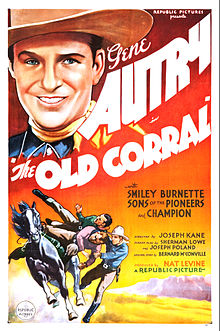
Roy Rogers, nicknamed the King of the Cowboys, was an American singer, actor, television host, freemason and rodeo performer.

Lester Alvin Burnett, better known as Smiley Burnette, was an American country music performer and a comedic actor in Western films and on radio and TV, playing sidekick to Gene Autry, Roy Rogers, and other B-movie cowboys. He was also a prolific singer-songwriter who is reported to have played proficiently over 100 musical instruments, sometimes more than one simultaneously. His career, beginning in 1934, spanned four decades, including a regular role on CBS-TV's Petticoat Junction in the 1960s.

Red River Valley, later retitled Man of the Frontier for American television screening, is a 1936 American Western film directed by B. Reeves Eason and starring Gene Autry, Smiley Burnette, and Frances Grant. Written by Dorrell and Stuart E. McGowan, the film is about a "ditch rider" and his sidekick who set out to find out who has been causing the accidents at a dam construction site.

Jasper Joseph Inman Kane was an American film director, film producer, film editor and screenwriter. He is best known for his extensive directorship and focus on Western films.

In Old Santa Fe is a 1934 American Western film directed by David Howard, starring Ken Maynard, George "Gabby" Hayes and Evalyn Knapp and featuring the first screen appearance of Gene Autry, singing a bluegrass rendition of "Wyoming Waltz" accompanied by his own acoustic guitar with Smiley Burnette on accordion. Autry and Burnette were uncredited, but the scene served as a screen test for the duo for subsequent singing cowboy films, beginning with The Phantom Empire (1935), in which Autry had his first leading role.
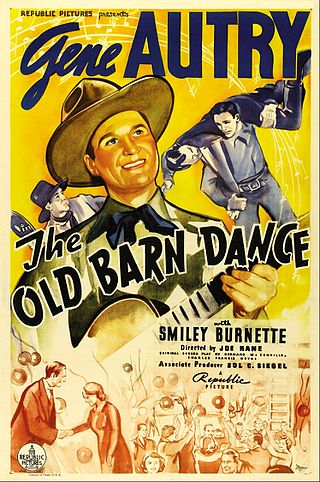
The Old Barn Dance is a 1938 American Western film directed by Joseph Kane and starring Gene Autry, Smiley Burnette, Joan Valerie, and written by Bernard McConville and Charles F. Royal.

The Big Show is a 1936 American Western musical film directed by Mack V. Wright and starring Gene Autry, Kay Hughes, and Smiley Burnette. Written by Dorrell and Stuart E. McGowan, the film is about a singing cowboy who confuses two girls by being himself and his own stunt double at the Texas Centennial in Dallas. Roy Rogers appears in the film as one of the Sons of the Pioneers.
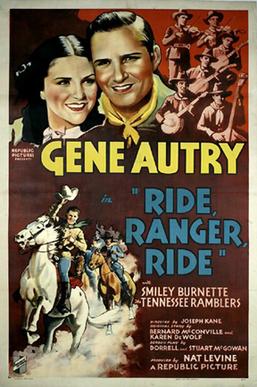
Ride Ranger Ride is a 1936 American Western film directed by Joseph Kane and starring Gene Autry, Smiley Burnette, and Kay Hughes. Based on a story by Bernard McConville and Karen DeWolf, and a screenplay by Dorrell and Stuart E. McGowan, the film is about a Texas Ranger working undercover to protect an Army wagon train full of ammunition and supplies. The Army doesn't believe him at first, until the Comanche arrive.
Round-Up Time in Texas is a 1937 American Western film directed by Joseph Kane and written by Oliver Drake. The film stars Gene Autry, Smiley Burnette, and Maxine Doyle. Despite its title, the majority of the film takes place in South Africa.

Public Cowboy No. 1 is a 1937 American Western film directed by Joseph Kane and starring Gene Autry, Smiley Burnette, and Ann Rutherford. Based on a story by Bernard McConville, the film is about a singing cowboy who chases down rustlers who are using airplanes, shortwave radios, and refrigerated trucks to steal cattle.

The Singing Vagabond is a 1935 American Western film directed by Carl Pierson and starring Gene Autry, Ann Rutherford, and Smiley Burnette. Written by Oliver Drake and Betty Burbridge, the film is about a cowboy who rides to the rescue when badguys kidnap a beautiful woman.
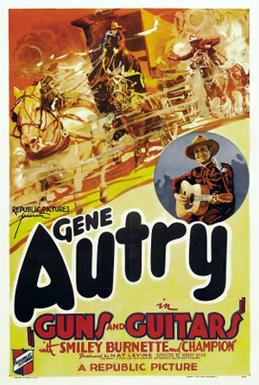
Guns and Guitars is a 1936 American Western film directed by Joseph Kane and starring Gene Autry, Smiley Burnette, and Dorothy Dix in her final film appearance. Written by Dorrell and Stuart E. McGowan, the film is about a singing cowboy who helps protect a county from fever-ridden cattle, and after being framed for murdering the sheriff, proves his innocence, gets elected sheriff, and then goes after the bad guy.

Colorado Sunset is a 1939 American Western film directed by George Sherman and starring Gene Autry, Smiley Burnette, and June Storey. Written by Betty Burbridge and Stanley Roberts, based on a story by Luci Ward and Jack Natteford, the film is about a singing cowboy and his buddies who discover that the ranch they bought is really a dairy farm—and worse, it's subject to intimidation from a protection racket that prevents dairy products from safely reaching the market.
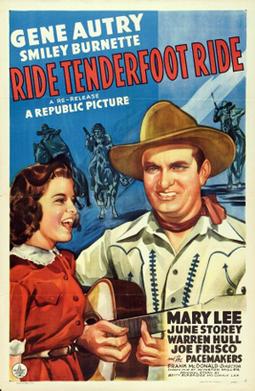
Ride, Tenderfoot, Ride is a 1940 American Western film directed by Frank McDonald and starring Gene Autry, Smiley Burnette, and June Storey. Written by Winston Miller, based on a story by Betty Burbridge and Connie Lee, the film is about a singing cowboy who inherits a meat-packing plant and must face stiff competition from a beautiful business rival.
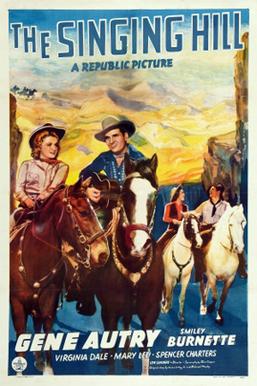
The Singing Hill is a 1941 American western film directed by Lew Landers and starring Gene Autry, Smiley Burnette, and Virginia Dale. Based on a story by Jesse Lasky Jr. and Richard Murphy, the film is about a singing cowboy and foreman of a ranch that may be sold to an unscrupulous banker by the young madcap heiress who is unaware that the sale will result in the local ranchers losing their free grazing land and their ranches. In the film, Autry performed the 1940 song "Blueberry Hill", first recorded by Sammy Kaye, which would become a standard recorded by such artists as Louis Armstrong (1949), Fats Domino (1956), and Elvis Presley (1957). The song became one of Autry's best-selling recordings. In 1987, "Blueberry Hill" received an ASCAP Award for Most Performed Feature Film Standards on TV.

Home in Wyomin' is a 1942 American Western film directed by William Morgan and starring Gene Autry, Smiley Burnette, and Fay McKenzie. Based on a story by Stuart Palmer, the film is about a singing cowboy who helps out a former employer in trouble with his failing rodeo while romancing a woman reporter. In Home in Wyomin', Autry sang his hit songs "Be Honest with Me", "Back in the Saddle Again", and "Tweedle O'Twill", as well as Irving Berlin's "Any Bonds Today", becoming the first major star to sing the official song of the U.S. Defense Bond campaign during the war.

Back in the Saddle is a 1941 American Western film directed by Lew Landers and starring Gene Autry, Smiley Burnette, and Mary Lee. Written by Richard Murphy and Jesse Lasky Jr., the film is about a singing cowboy who attempts to bring peace between ranchers and the operator of a copper mine whose chemicals are poisoning the area's water supply. The film features several of Autry's hit songs, including "Back in the Saddle Again", "I'm An Old Cowhand", and "You Are My Sunshine".

Call of the Canyon is a 1942 American Western film directed by Joseph Santley and starring Gene Autry, Smiley Burnette, the Sons of the Pioneers, and Ruth Terry. Based on a story by Maurice Rapf and Olive Cooper, the film is about a singing cowboy who leads a group of cattlemen against the corrupt agent of a large packing company looking to swindle them by undercutting the buying price for beef. The film features three songs by Autry and the Sons of the Pioneers, including the classic "Take Me Back to My Boots and Saddle".
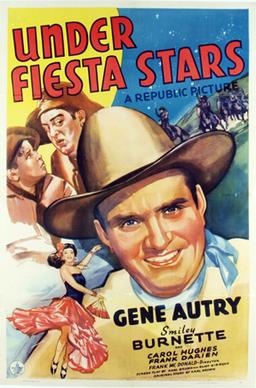
Under Fiesta Stars is a 1941 American western film directed by Frank McDonald and starring Gene Autry, Smiley Burnette, and Carol Hughes. Based on a story by Karl Brown, the film is about a singing cowboy and rodeo champion who inherits a ranch and mining property along with his foster father's niece. She wants to sell but needs his consent, and he wants to work the mine according to his foster father's wishes. Problems arise when the niece unwittingly gets involved with unscrupulous lawyers who are plotting to steal the mine. The film features the songs "Purple Sage in the Twilight", "When You're Smiling", and the title song.
Fleming Allan was an American composer of Western music, who helped make that genre popular in the 1930s.
